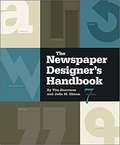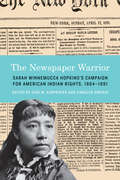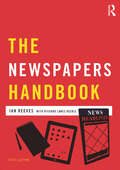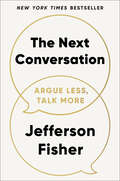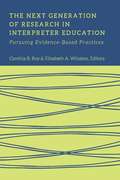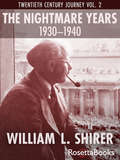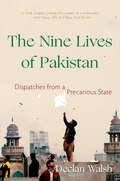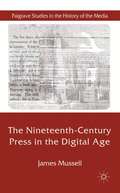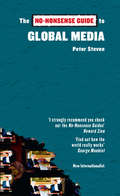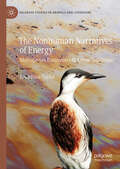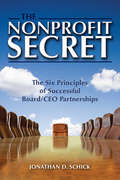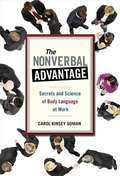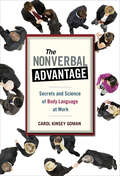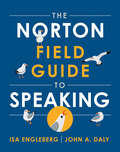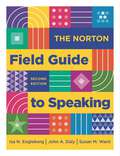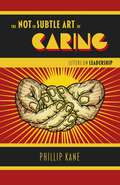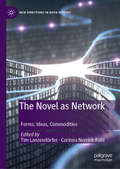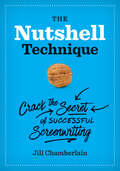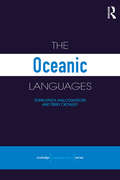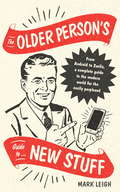- Table View
- List View
The Newspaper Axis: Six Press Barons Who Enabled Hitler
by Kathryn S. OlmstedHow six conservative media moguls hindered America and Britain from entering World War II &“A landmark in the political history of journalism.&”—Michael Kazin, author of What It Took to Win: A History of the Democratic Party As World War II approached, the six most powerful media moguls in America and Britain tried to pressure their countries to ignore the fascist threat. The media empires of Robert McCormick, Joseph and Eleanor Patterson, and William Randolph Hearst spanned the United States, reaching tens of millions of Americans in print and over the airwaves with their isolationist views. Meanwhile in England, Lord Rothermere&’s Daily Mail extolled Hitler&’s leadership and Lord Beaverbrook&’s Daily Express insisted that Britain had no interest in defending Hitler&’s victims on the continent. Kathryn S. Olmsted shows how these media titans worked in concert—including sharing editorial pieces and coordinating their responses to events—to influence public opinion in a right-wing populist direction, how they echoed fascist and anti‑Semitic propaganda, and how they weakened and delayed both Britain&’s and America&’s response to Nazi aggression.
The Newspaper Designer's Handbook
by Tim Harrower Julie ElmanThroughout the seven editions of this book, Harrower has successfully deconstructed the process of laying out newspaper pages. For journalism students and professionals alike, countless designers have used this book to learn how to design and improve their skills as visual communicators. Harrower’s unique voice and quirky sense of humor are still very much alive in the seventh edition.
The Newspaper Warrior: Sarah Winnemucca Hopkins's Campaign for American Indian Rights, 1864-1891
by Cari M. Carpenter Carolyn Sorisio Sarah Winnemucca HopkinsSarah Winnemucca Hopkins (Northern Paiute) has long been recognized as an important nineteenth-century American Indian activist and writer. Yet her acclaimed performances and speaking tours across the United States, along with the copious newspaper articles that grew out of those tours, have been largely ignored and forgotten. The Newspaper Warrior presents new material that enhances public memory as the first volume to collect hundreds of newspaper articles, letters to the editor, advertisements, book reviews, and editorial comments by and about Sarah Winnemucca Hopkins. This anthology gathers together her literary production for newspapers and magazines from her 1864 performances in San Francisco to her untimely death in 1891, focusing on the years 1879 to 1887, when Winnemucca Hopkins gave hundreds of lectures in the eastern and western United States; published her book, Life among the Piutes: Their Wrongs and Claims (1883); and established a bilingual school for Native American children. Editors Cari M. Carpenter and Carolyn Sorisio masterfully assemble these exceptional and long-forgotten articles in a call for a deeper assessment and appreciation of Winnemucca Hopkins’s stature as a Native American author, while also raising important questions about the nature of Native American literature and authorship.
The Newspapers Handbook (Media Practice)
by Richard Keeble Ian ReevesThis new edition of The Newspapers Handbook presents an enlightening examination of an ever-evolving industry, engaging with key contemporary issues, including reporting in the digital age and ethical and legislative issues following the hacking scandal to display a comprehensive anatomy of the modern newsroom. Richard Lance Keeble and Ian Reeves offer readers expert practical advice, drawing on a wide range of examples from print and digital news sources to illustrate best practice and the political, technological and financial realities of newspaper journalism today. Other key areas explored include: the language of news basic reporting the art of interviewing feature writing the role of social media in reporting investigative reporting court reporting reporting on national and local government guidance on training and careers for those entering the industry.
The Next Conversation: Argue Less, Talk More
by Jefferson FisherTHE INSTANT NEW YORK TIMES BESTSELLERFrom communication expert Jefferson Fisher, the definitive book on making your next conversation the one that changes everythingNo matter who you&’re talking to, The Next Conversation gives you immediately actionable strategies and phrases that will forever change how you communicate. Jefferson Fisher, trial lawyer and one of the leading voices on real-world communication, offers a tried-and-true framework that will show you how to transform your life and your relationships by improving your next conversation.Fisher has gained millions of followers through short, simple, practical videos teaching people how to argue less and talk more. Whether it&’s handling a heated conversation, dealing with a difficult personality, or standing your ground with confidence, his down-to-earth teachings have helped countless people navigate life&’s toughest situations. Now for the first time, Fisher has distilled his three-part communication system (Say it with control, Say it with confidence, Say it to connect) that can easily be applied to any situation.You will learn:Why you should never &“win&” an argumentHow to assert yourself and communicate with intentionHow to set boundaries and frame conversationsWhy saying less is often moreHow to overcome conflict with connectionThe Next Conversation will give you practical phrases that will lead to powerful results, from breaking down defensiveness in a hard talk with a family member to finding your own assertive voice at the boardroom conference table. Your every word matters, and by controlling how you communicate every day, you will create waves of positive impact that will resonate throughout your relationships to last a lifetime.Everything you want to say, and how you want to say it, can be found in The Next Conversation.
The Next Generation of Research in Interpreter Education: Pursuing Evidence-Based Practices (The Interpreter Education Series #10)
by Cynthia B. Roy Elizabeth A. WinstonThis collection contributes to an emerging body of research in sign language interpreter education, a field in which research on teaching practices has been rare. The Next Generation of Research in Interpreter Education investigates learning experiences and teaching practices that provide the evidence necessary to inform and advance instructional approaches. The five studies included in this volume examine role-play activities in the classroom, the experiences of Deaf students in interpreting programs, reducing anxiety in the interpreting process, mentoring, and self-assessment. The contributors are a nascent group of educators who represent a growing mastery of contemporary standards in interpreter education. Their chapters share a common theme: the experiences and learning environments of students as they progress toward entry into the interpreting profession.
The Night of the Gun: A reporter investigates the darkest story of his life. His own.
by David CarrFrom David Carr (1956–2015), the “undeniably brilliant and dogged journalist” (Entertainment Weekly) and author of the instant New York Times bestseller that the Chicago Sun-Times called “a compelling tale of drug abuse, despair, and, finally, hope.”Do we remember only the stories we can live with? The ones that make us look good in the rearview mirror? In The Night of the Gun, David Carr redefines memoir with the revelatory story of his years as an addict and chronicles his journey from crack-house regular to regular columnist for The New York Times. Built on sixty videotaped interviews, legal and medical records, and three years of reporting, The Night of the Gun is a ferocious tale that uses the tools of journalism to fact-check the past. Carr’s investigation of his own history reveals that his odyssey through addiction, recovery, cancer, and life as a single parent was far more harrowing—and, in the end, more miraculous—than he allowed himself to remember. Fierce, gritty, and remarkable, The Night of the Gun is “an odyssey you’ll find hard to forget” (People).
The Nightmare Years, 1930–1940 (Twentieth Century Journey #2)
by William L. ShirerThe famous journalist and author of The Rise and Fall of the Third Reich documents his front row seat at the pivotal events leading up to World War II. In the second of a three-volume series, William L. Shirer tells the story of his own eventful life, detailing the most notable moments of his career as a journalist stationed in Germany during the rise of the Third Reich. Shirer was there while Hitler celebrated his new domination of Germany, unleashed the Blitzkrieg on Poland, and began the conflict that would come to be known as World War II. This remarkable account tells the story of an American reporter caught in a maelstrom of war and politics, desperately trying to warn Europe and the United States about the dangers to come. This memoir gives readers a chance to relive one of the most turbulent periods in twentieth century history—painting a stunningly intimate portrait of a dangerous decade. &“Mr. Shirer stirs the ashes of memory in a personal way that results in both a strong view of world events and of the need for outspoken journalism. Had Mr. Shirer been merely a bland &‘objective&’ reporter without passion while covering Hitler&’s Third Reich, this book and his other histories could never have been written.&” —The New York Times
The Nine Lives of Pakistan: Dispatches From A Precarious State
by Declan WalshA New York Times New Book to Watch For (November 2020) The former New York Times Pakistan bureau chief paints an arresting, up-close portrait of a fractured country. Declan Walsh is one of the New York Times’s most distinguished international correspondents. His electrifying portrait of Pakistan over a tumultuous decade captures the sweep of this strange, wondrous, and benighted country through the dramatic lives of nine fascinating individuals. On assignment as the country careened between crises, Walsh traveled from the raucous port of Karachi to the salons of Lahore, and from Baluchistan to the mountains of Waziristan. He met a diverse cast of extraordinary Pakistanis—a chieftain readying for war at his desert fort, a retired spy skulking through the borderlands, and a crusading lawyer risking death for her beliefs, among others. Through these “nine lives” he describes a country on the brink—a place of creeping extremism and political chaos, but also personal bravery and dogged idealism that defy easy stereotypes. Unbeknownst to Walsh, however, an intelligence agent was tracking him. Written in the aftermath of Walsh’s abrupt deportation, The Nine Lives of Pakistan concludes with an astonishing encounter with that agent, and his revelations about Pakistan’s powerful security state. Intimate and complex, attuned to the centrifugal forces of history, identity, and faith, The Nine Lives of Pakistan offers an unflinching account of life in a precarious, vital country.
The Nineteenth-Century Press in the Digital Age
by James MussellNewspapers and periodicals have long been recognized as indispensable resources for those interested in all aspects of the nineteenth century, but they remain neglected due to difficulties working with the large and complicated print archive. In The Nineteenth-Century Press in the Digital Age, Mussell provides an accessible account of how this archive has been transformed through digitization. Now that it is relatively accessible, he argues that we cannot afford to continue to ignore this material. However, we must be able to understand both the complicated forms of newspapers and periodicals and how they have been transformed by various digital resources. In this book, Mussell situates both the print and the digital within a broader media history and argues that the way to understand a culture is through its media, whether this is in the nineteenth century, or today.
The No-Nonsense Guide to Global Media
by Peter StevenPeter Steven explores the diversity of world media, from the corporate to the independent. He introduces readers to the political economy of the major media outlets, looking at the concentration of ownership and the convergence of technologies and media functions. In doing so, he encourages us to question how the media reflects society: are we passive recipients, or do we have a part in constructing the world?Peter Steven is a freelance writer based in Toronto, Canada. He has been a film columnist for New Internationalist and The Beaver magazines, and associate editor of Jump Cut magazine.
The Nonhuman Narratives of Energy: Multispecies Encounters in Extraction Zones (Palgrave Studies in Animals and Literature)
by Josephine TaylorThis book brings the emerging field of petrocultures and energy humanities discourse into conversation with the field of animal studies. Taylor examines how fossil fuels have frequently been described as the lifeblood of capitalist modernity, making petroleum appear as something intrinsic to human life. Through examining works such as Herman Melville's Moby Dick, Nnedi Okorafor&’s Lagoon and Michel Faber&’s Under the Skin, this book highlights the commodification of nonhuman life in the history of energy and, paradoxically, how these nonhuman actors have been unacknowledged and silenced through time.
The Nonprofit Secret: The Six Principles of Successful Board/CEO Partnerships (The\nonprofit Secret Ser.)
by Jonathan D. SchickA nonprofit leadership consultant offers a blueprint for success in this guide to healthy governance and executive communication.All nonprofit organizations start with a noble mission, but good intentions alone are no guarantee of success. All too often, nonprofit boards are hampered by political and functional challenges that negatively impact operations. Conflicts between the board and the CEO can greatly inhibit effectiveness despite everyone’s devotion to the same set of goals.Jonathan D. Schick has spent years working with nonprofits of all sizes, helping each one achieve maximum impact by addressing the vitally important partnership at its heart. In this groundbreaking book, Schick shares the Six Principles that can unlock an organization’s potential and lead to successful board/CEO partnerships.
The Nonverbal Advantage: Secrets and Science of Body Language at Work
by Carol Kinsey GomanGoman draws on the latest research and 25 years of experience as a consultant, coach, and therapist in this guide to body language. Cartoons, b&w photos, anecdotes, and simple exercises help readers gain control of the messages their bodies are sending so that they can project a more accurate and compelling picture of who they are to their colleagues, clients, and partners. Annotation ©2008 Book News, Inc., Portland, OR (booknews.com)
The Nonverbal Advantage: Secrets and Science of Body Language at Work
by Carol Kinsey GomanWhat are you saying when you&’re not speaking? A top consultant &“shows you how to use body language skills to build stronger professional relationships&” (Robert L. Dilenschneider, author of The Ultimate Guide to Power and Influence). How is the audience reacting to my presentation? Should I believe what my boss just told me? Is this person a potential buyer, or am I just wasting my time? How do I know if the CEO really supports my idea? Studies show that ninety-three percent of the messages people receive from us—and that we receive from them—have nothing to do with the words that are said. Therefore, strong nonverbal communication skills are a huge professional advantage, but until now little information has been available about how to hone the ability to use and interpret body language on the job. In The Nonverbal Advantage, Carol Kinsey Goman combines the latest research and her twenty-five years of practical experience as a consultant, coach, and therapist to offer a fun and practical guide to understanding what we and the people we work with are saying without speaking. While firmly grounded in recent discoveries in evolutionary psychology, neurobiology, sociology, criminology, anthropology, and communication studies, Goman&’s book is written in an informal, conversational tone and illustrates her points with cartoons, photos, and entertaining anecdotes. She also includes a chapter on translating body language across different cultures, and dozens of simple, enlightening exercises you can practice on and off the job—to gain control over the message you&’re sending.
The Norton Field Guide to Speaking (First Edition)
by John Daly Isa EnglebergA uniquely flexible and teachable guide to public speaking The Norton Field Guide to Speaking offers students the kind of helpful advice and encouragement found in leading full-length textbooks in a user-friendly, to-the-point, easily referenced “field guide” format. Its uniquely flexible, modular organization gives experienced instructors the freedom to teach their course as they choose, while its color-coded cross-referencing system and extensive student and instructor resources provide the structural support and guidance that new instructors need. This purchase offers access to the digital ebook only.
The Norton Field Guide to Speaking (Second Edition)
by John Daly Susan Ward Isa EnglebergA uniquely easy-to-use, easy-to-reference guide to speaking today The Norton Field Guide to Speaking offers students practical advice and positive encouragement in a user-friendly, easily-referenced “field guide” format. Based on decades of research and teaching experience from coauthors Isa Engleberg and John Daly, this is a guide to the most important—and most challenging—skills in public speaking, including topics not often found in other public speaking texts, like telling stories and generating interest. The balanced and diverse set of Notable Speaker features illustrate the book’s practical advice—and are available with annotated video recordings in the ebook. The Second Edition is an even better resource for students, with a bold new design and revisions based in part on the classroom experience of coauthor and award-winning teacher Susan Ward, who used the First Edition in her classes. New advice helps students prepare for the unique challenges of speaking today, including using generative AI responsibly, preparing to deliver presentations online, handling audience Q&A, using inclusive and respectful language, and more. Together, the authors have crafted a revision that builds on the strengths of the First Edition to help today’s students prepare for any speaking situation. This purchase offers access to the digital ebook only.
The Not So Subtle Art of Caring: Letters on Leadership
by Phillip KaneVirgin&’s Richard Branson, Zappos&’ Tony Hsieh, and Tesla&’s Elon Musk, apart from their obvious success, all share another thing in common. Each utilizes storytelling to maximize their effectiveness as leaders. Many of the most influential leaders of our and all time, including arguably the most influential leader in history, used storytelling whenever they had a particularly important point to make. Encouraged by these influences, a father who was a known storyteller and a Nigerian priest who used stories to bridge a language barrier, author, and successful businessperson, Phillip Kane used stories each Friday throughout his career to help business associates relate to key issues facing the organizations he had the privilege to lead. These weekly letters had less to do with what was going on in the business than how people thought about what was going on in the business. By helping shift and align his teams&’ point of view, Kane and the teams he led were able to accomplish more and win more often. All because of the stories he told. Many of them are assembled here in one place for the first time. Organized around key themes like encouragement, trust, and gratitude, Kane also provides additional insights for existing or aspiring leaders looking for a different, better way to appeal to those who should be following them. Featured twice in Kouzes&’ & Posner&’s, The Leadership Challenge (Wiley), first-time author, Phillip Kane&’s storytelling technique and the leadership lessons he imparts are key for any leader seeking to create winning teams built on a fundamental foundation of caring and service to others.
The Novel as Network: Forms, Ideas, Commodities (New Directions in Book History)
by Corinna Norrick-Rühl Tim LanzendörferThe Novel as Network: Forms, Ideas, Commodities engages with the contemporary Anglophone novel and its derivatives and by-products such as graphic novels, comics, podcasts, and Quality TV. This collection investigates the meaning of the novel in the larger system of contemporary media production and (post-)print culture, viewing the novel through the lens of actor network theory as a node in the novel network. Chapters underscore the deep interconnection between all the aspects of the novel, between the novel as a (literary) form, as an idea, and as a commodity. Bringing together experts from American, British, and Postcolonial Studies, as well as Book, Publishing, and Media Studies, this collection offers a new vantage point to view the novel in its multifacetious expressions today.
The Nutshell Technique: Crack the Secret of Successful Screenwriting
by Jill ChamberlainA veteran Hollywood script consultant unlocks the secrets of storytelling in this &“clever, fresh way of analyzing structure&” (Creative Screenwriting magazine). Veteran script consultant Jill Chamberlain knows that most first-time screenwriters don&’t understand how to tell a story. These writers may have snappy dialogue, interesting characters, and clever plot devices—but what they deliver isn&’t a story. It&’s a situation. In order to explain the difference, Chamberlain created the Nutshell Technique, a method whereby writers identify eight dynamic, interconnected elements that are required to successfully tell a story. In this book, Chamberlain uses easy-to-follow diagrams (&“nutshells&”) to explain how the Nutshell Technique can make or break a film script. She takes readers step-by-step through thirty classic and contemporary movies, showing how such dissimilar screenplays as Casablanca, Chinatown, Pulp Fiction, Little Miss Sunshine, Juno, and Argo all have the same system working behind the scenes. She then teaches readers how to apply these principles to their own screenwriting.
The Nutshell Technique: Crack the Secret of Successful Screenwriting
by Jill ChamberlainA veteran Hollywood script consultant unlocks the secrets of storytelling in this &“clever, fresh way of analyzing structure&” (Creative Screenwriting magazine). Veteran script consultant Jill Chamberlain knows that most first-time screenwriters don&’t understand how to tell a story. These writers may have snappy dialogue, interesting characters, and clever plot devices—but what they deliver isn&’t a story. It&’s a situation. In order to explain the difference, Chamberlain created the Nutshell Technique, a method whereby writers identify eight dynamic, interconnected elements that are required to successfully tell a story. In this book, Chamberlain uses easy-to-follow diagrams (&“nutshells&”) to explain how the Nutshell Technique can make or break a film script. She takes readers step-by-step through thirty classic and contemporary movies, showing how such dissimilar screenplays as Casablanca, Chinatown, Pulp Fiction, Little Miss Sunshine, Juno, and Argo all have the same system working behind the scenes. She then teaches readers how to apply these principles to their own screenwriting.
The Oceanic Languages (Routledge Language Family Ser.)
by John Lynch Terry Crowley Malcolm RossThis new volume of the Language Family Series presents an overview of the Oceanic subgroup of the Austronesian languages, spread across a region embracing eastern Indonesia, Melanesia, Polynesia, and Micronesia. It provides sufficient phonological and grammatical data to give typologists and comparativists a good idea of the nature of these languag
The Old School Advantage: Timeless Tools for Every Generation
by J. N. WhiddonThe Old School founder and acclaimed business author shares the timeless tools and wisdom you need to succeed in today’s professional world.In an age where information is everywhere but wisdom is elusive, it takes more than technical skill to stand out. In The Old School Advantage, J. N. Whiddon teaches you how to use old-school communication skills, like delivering impactful presentations using ready recall and influencing people with WOW! words and probing questions that make a lasting impression. As Whiddon himself knows, school never lets out—no matter your age. Everyone from young professionals just entering the workforce to seasoned leaders looking to stay at the top of their game can benefit from Whiddon’s indespensible tools. Start building a life you love, and a legacy that will endure, with the Old School advantage.
The Older Person's Guide to New Stuff: From Android to Zoella, a complete guide to the modern world for the easily perplexed
by Mark LeighSTRUGGLING TO STAY IN TOUCH WITH ELDERLY PARENTS DURING THE LOCKDOWN? WANTING TO HELP ISOLATED RELATIVES WITH ONLINE ORDERING? THIS IS THE PERFECT GUIDE FOR ANYONE GRAPPLING FOR THE FIRST TIME WITH FACETIME, GOOGLE HANGOUTS OR ANY OTHER ASPECT OF THE MODERN WORLD.A handy guide for anyone who says, 'The Facebook' or 'The Google' or who asks, 'Do they deliver emails on Sunday?' This is a book for the elderly and not-so-elderly who are bamboozled not just by the technology of the contemporary world, but also various modern concepts and conceits that the more youthful take for granted.It explains a host of modern concepts and technologies that have entered everyday use and parlance but which are alien (and possibly frightening) not just to the elderly - but probably also to anyone over 45. These concepts are universal and should therefore appeal to readers in the UK, Australia, US and Europe. The definitions are all real, but entertaining, making use of easy-to-understand 'real world' references or examples to explain them.
The Older Person's Guide to New Stuff: From Android to Zoella, a complete guide to the modern world for the easily perplexed
by Mark LeighSTRUGGLING TO STAY IN TOUCH WITH ELDERLY PARENTS DURING THE LOCKDOWN? WANTING TO HELP ISOLATED RELATIVES WITH ONLINE ORDERING? THIS IS THE PERFECT GUIDE FOR ANYONE GRAPPLING FOR THE FIRST TIME WITH FACETIME, GOOGLE HANGOUTS OR ANY OTHER ASPECT OF THE MODERN WORLD.A handy guide for anyone who says, 'The Facebook' or 'The Google' or who asks, 'Do they deliver emails on Sunday?' This is a book for the elderly and not-so-elderly who are bamboozled not just by the technology of the contemporary world, but also various modern concepts and conceits that the more youthful take for granted.It explains a host of modern concepts and technologies that have entered everyday use and parlance but which are alien (and possibly frightening) not just to the elderly - but probably also to anyone over 45. These concepts are universal and should therefore appeal to readers in the UK, Australia, US and Europe. The definitions are all real, but entertaining, making use of easy-to-understand 'real world' references or examples to explain them.

